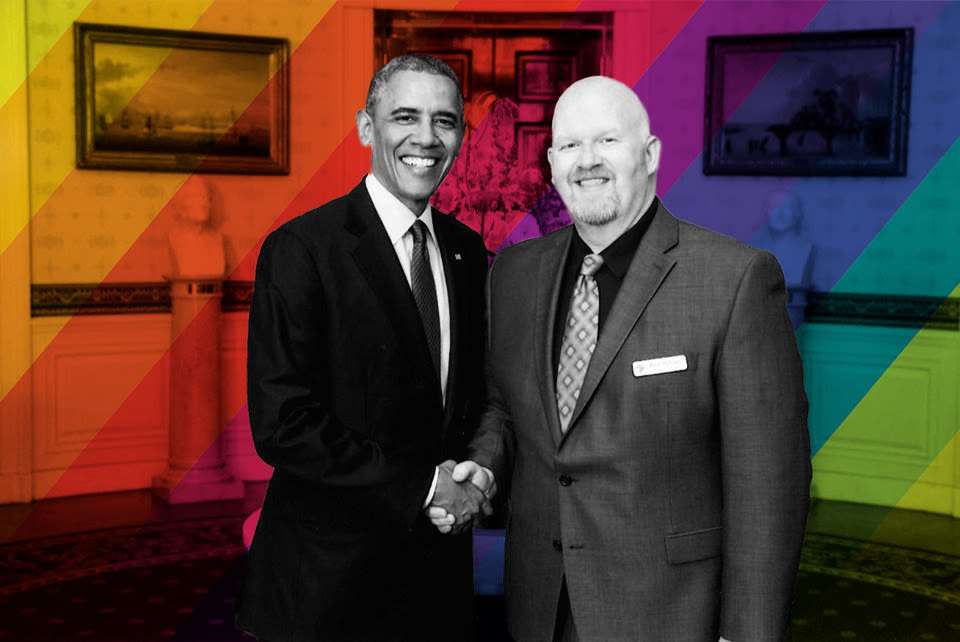Part of a Landmark LGBTQ Case, a Portland Teacher Finds Redemption

Image: Courtesy Brett Bigham and Brian Breneman
Brett Bigham, Oregon’s 2014 Teacher of the Year who later lost his job in a blaze of lawyers and mudslinging, was noodling around on Facebook on Tuesday, following a link from a Star Trek fan group to a transgender activism group when a stranger posted that the public apology Bigham had been waiting six years for had just dropped.
He clicked over to the Multnomah Education Service District’s feed, and there it was: five paragraphs, signed by current board chair Helen Ying, and including the following sentences: “We apologize to Mr. Brett Bigham. No one should have to endure the discriminatory actions that Mr. Bigham describes experiencing at MESD. They were wrong when they occurred, just as they would be wrong today.”
Bigham lost it, he told Portland Monthly. “I put my head inside my shirt and sobbed. I didn’t know what else to do.”
It was the latest revelation in a week—a month, a year, a lifetime—full of them. Like the rest of the country, Bigham woke Monday to the news that the U.S. Supreme Court, improbably led by Trump-appointed Justice Neil Gorsuch, had protected the rights of LGBTQ+ people from workplace discrimination. Bigham’s story was reviewed by the justices as they made their decision, as part of an amicus brief submitted by the Southern Poverty Law Center.
That story stretches back to his appointment as Oregon’s Teacher of the Year, which marked a bunch of firsts: Bigham was the first openly gay person appointed to that role in Oregon, the first special education teacher, and the first whose role was with the post-graduate level, in his role as a life-skills teacher for 18-to-21-year olds with developmental disabilities.
His employers nominated him for the honor, which included a White House meet-and-greet with Barack Obama, but their relationship soon turned sour, and then toxic, with the district accusing him of absenteeism and unprofessionalism. Bigham’s story, which he unfurled in one cathartic blast on Twitter in the wake of the Supreme Court’s decision, is very different. According to Bigham, he faced one threat after another: Mention his sexual orientation, and his life would be in danger, his supervisor allegedly told him. He says he was forced to cancel a meeting with the Grant High School Gay-Straight Alliance, at which he had been scheduled to speak about teen suicide, because “meeting with gay students has no value to this school district.” (The Multnomah ESD contracts with local school districts around the county to provide specialized services to at-risk populations.)
Bigham lost his classroom, and then his job, eventually accepting a $140,000 payment from the Multnomah ESD, but refusing to sign a non-disclosure agreement. In the years since, he’s been heavily involved in equity work and the rights of the disabled, but the former Teacher of the Year hasn’t been able to find permanent employment. Most recently, he served a long-term substitute for a K-5 classroom at Pioneer Special School in Portland, for special needs children who need more intensive instruction.
He wasn’t the only one who lost his position. The ESD’s superintendent was gone, along with the head of special education, along with his direct supervisor, though some, he says, have gone on to hold similar positions at other local school districts and universities.
As for Bigham, through connections made through his work as an educator/ambassador for the Education Civil Rights Alliance, his story made its way to the Southern Poverty Law Center, and eventually, all the way to the nation’s highest court.
“I thought the case was going to lose,” he said Wednesday. “I had been trying to put myself in that mode—well, you put in a good fight. You tried.”
But his side won, and Bigham took to Twitter, unleashing a thread that is approaching 72,000 retweets and 300,000 likes.
tw-align-centerIn 2014, after being named Teacher of the Year, my supervisor told me if I said I was gay in public I would be "shot in the head."
— Brett Bigham Socially Distant He/Him/His/HeyYou! (@2014ORTOY) June 15, 2020
I was told I would be fired if I did not bring her all of my private mail from home to read. (more)
“In the rest of my life, there was not a better time to demand an apology over this,” he said Wednesday. “I was being used as an example, in the highest court of the land, of wrong behavior. I wanted every gay kid in this state to see that apology. Because I was representing those kids.”
Bigham did point out that Tuesday's apology never mentioned his group of former students, several of whom he remains in touch with.
“My students deserve an apology that needs to be more thoughtful that the one they gave me. In my future, I hope MESD and I figure out a way to make it right for those kids,” he says. “I can’t talk about those kids much, still. I picture their faces, and what it must have been like when suddenly I was just gone, out of their life. I had them for three years. I had students who were blind and autistic and didn’t respond to anyone but me. They came to school one day and I never came back, and no one ever told them why.”




